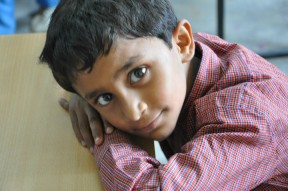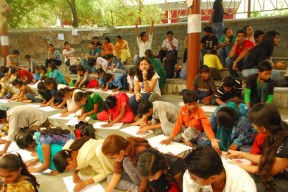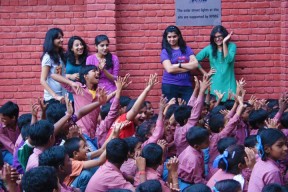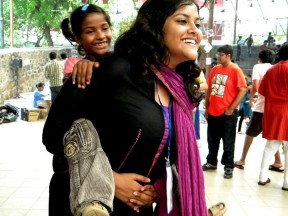Recently, two news reports more or less summed up the chasm between less and excess in India. An NGO alleged that 64 Bhil children in Madhya Pradesh’s Satna district have died of malnutrition. On the other hand, Hyderabad got ready to celebrate its version of the Spanish Tomatino festival and a friend created a Facebook page (https://www.facebook.com/permalink.php?story_fbid=185221971542829&id=134206369977723#!/pages/Protest-the-Tomatino-festival/156765734401050) to question the sanity of spending a few thousand rupees to waste tomatoes when both the money and the wasted produce can feed a village for a week.
The contrast between these two Indias where one can’t feed two square meals a day to its children and the other has food to squish underfoot, also brings us to the question, “what do the educated and privileged young in India think about the disparity they see around them?”
Isn’t starvation of many kinds in this country where millions of children have to go without not just basic nutrition but education, fundamental rights like play time, a protected childhood, health and a feeling of being safe and loved? These kids are not on the priority list of any politician and their only hope is that those who have more than them will share a little and reach out to help or to just smile.
For the past few weeks, we have been bringing to you uplifting stories of how members of the youth organisation, AIESEC Delhi University have addressed many such questions and reached out to underprivileged kids through an initiative called Udaan 2011.
At the end of Udaan’s three week long educational and recreational activities, more than 3000 young kids took back with them, the realisation that their lives, issues, talents and ideas were of value. And the volunteers came away with the rewarding feeling of having made a difference, even if fleetingly to a reality that easily lends itself to oblivion.
The final event of Udaan 2011, Balkalakaar was held on 30st July 2011 at National Bal Bhawan in Delhi and over 1000 children from organizations like Prayas, SMILE and CRY participated in an art contest coordinated by 200 young volunteers, international interns of AIESEC, students of various schools and colleges of Delhi.
Apart from cultural performances and plays by college theatre groups from across Delhi, the winners of the competition were promised sponsorship and talent coaching with National Bal Bhawan for a year.
One of the key members of the organising committee, Raghav Bagai recalls, “My journey with Udaan has been something that cannot be expressed in plain words alone. But what I can say is that it has changed me for the better.The experience has been really enriching. The amount of satisfaction and the amount of happiness I got, was much beyond anything else in my life. After each event, the feeling of accomplishment and the feeling of doing something worthwhile was priceless. There were many big and small moments like children inviting me to lunch or dinner. Some young children hugging me while leaving and saying that they will remember the day throughout their life..so many heart warming gestures. I realised just how beautiful it is to be a child.”
Richa Sharma, president of the organising committee adds, “Knowing that you’ve spread happiness in the lives of thousands of little children and given them a reason to believe in themselves and their potential, is a feeling that cannot be described. Udaan 2011 was only the beginning of this change.”
Volunteer Nishtha Malhotra says, “Sometimes a smile that you bring to someone’s face can bring you greater pleasure than your own happiness.”
These statements reveal that a tentative bridge has been built between the enlightened young Indians and those who need maybe just a straw of light to swim to the other side. These examples show us that there will perhaps be a better dialogue between privilege and poverty because of such initiatives than was possible before. And that the urban young Indian is perhaps not as self-absorbed as the irresponsible characters being celebrated in self styled cult hits like Dev D and Delhi Belly. Or the few who think they can live their life to the fullest only if they throw tomatoes at each other and pretend that they are in Spain. Reassuring thought, that.
Reema Moudgil is the author of Perfect Eight (http://www.flipkart.com/b/books/perfect-eight-reema-moudgil-book-9380032870?affid=unboxedwri )










rays of hope.
thank you so much
My Self xama Kshatriya , basically i am Ahmadabad based an artiest , here i am developing and encouraging young children for their freedom of expression through colours.This thing I am doing last 3 years , i had also organized an exhibition in Ahmadabad for the same purpose, of this i am also sending their art work(Paintings) for national and international exhibition .
Also some work in under process to find art work from small villages, slum area , some association of kids foundation to give better platform to express their art.
And for this we are looking for the NGO who is working for the children … here i found that UDAAN has work a very good and every thing is in proper direction and differt in such a way …
i would like to be a part of your chennel if there is any kind of project in Ahmedabad .
Feel free to call us on + 91 9374911162.
Thanking You,
Xama Kshatriya
Project Maneger
Gloria- glory of art